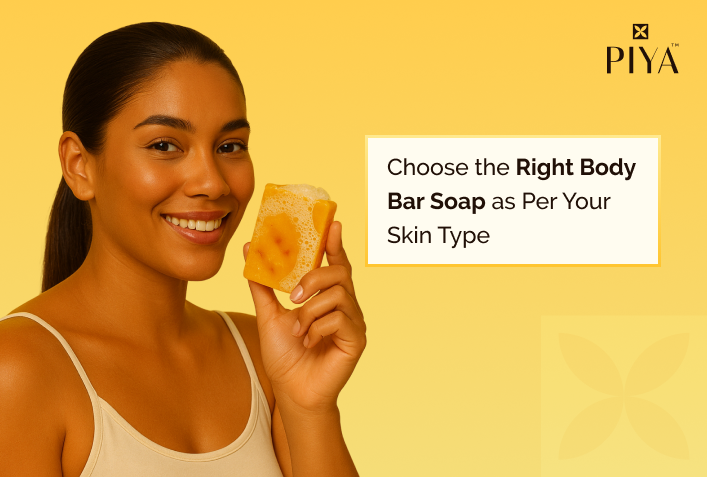
Choose the Right Body Bar Soap as Per Your SkinType
Sunita shastriShare
Choosing the right body bar soap might seem like a simple task, but it can have a major impact on your skin’s health. With countless options, from herbal bar soap to medicated bars, the decision can be overwhelming. The right soap does more than clean; it nourishes, protects, and balances your skin. Whether you’re looking for the best body soap for sensitive skin or a gentle organic bar soap, understanding your skin and the soap’s ingredients is the key to making a choice that works for you.
Understanding the Basics of Body Bar Soaps
What is Body Bar Soap?
Body bar soap is a solid form of cleanser designed to remove dirt, sweat, and excess oils from the skin. In contrast to the liquid body washes, bar soaps are concentrated, often enriched with natural oils, glycerin, or herbal extracts to provide additional benefits. Some bars focus purely on cleansing, while others aim to moisturize, soothe irritation, or target specific skin concerns. The choice of organic bar soaps depends on your skin type and on the results you expect from your daily cleansing routine.
The Role of pH
Your skin’s natural pH is slightly acidic, usually between 4.5 and 5.5, which protects it from harmful bacteria and helps maintain moisture. Many conventional soaps are alkaline, which can disrupt this balance and make the skin more prone to dryness, irritation, or breakouts. Natural, organic, and herbal bar soap often maintains a pH closer to the skin’s natural level, making them ideal for daily use while supporting long-term skin health.
The Balance Between Cleansing and Protecting
Cleansing is important, but maintaining skin protection is equally essential. Good organic bar soaps remove dirt without stripping essential oils. Ingredients like glycerin, natural oils, shea butter, or cocoa butter help retain moisture while providing gentle cleansing. Striking this balance is especially critical for sensitive or dry skin, where harsh soaps can cause redness, tightness, or irritation.
Why Choosing the Right Soap Matters
The soap you choose daily can affect your skin’s texture, moisture, and overall health. Using a harsh or inappropriate soap can lead to dryness, irritation, and even acne flare-ups. For dry skin, the wrong soap can make tightness and flakiness worse, while oily skin can become more prone to breakouts if cleansing is too aggressive or the soap is heavy. Sensitive skin may react with redness or itching, highlighting the importance of selecting gentle organic bar soaps.
Many people make the mistake of choosing a soap based on fragrance alone. A bar may smell delightful, but it can contain artificial chemicals that irritate the skin. Ignoring the ingredients or using a soap designed for the body on the face can also cause problems, as facial skin is more delicate and requires milder formulations. Understanding these factors is essential when looking for the best body soap for sensitive skin or other skin-specific options.
Common Mistakes in Choosing Soap
Choosing a body soap might seem straightforward, but several common mistakes can affect skin health. Like,
- Picking a soap solely for its scent often leads to irritation because many fragrant soaps contain chemicals that aren’t skin-friendly.
- Ignoring the label is another common error; terms like “gentle” or “natural” do not always guarantee a safe formula.
- Using the same soap for both face and body is also problematic. Facial skin is thinner and more sensitive, and strong body soaps can strip it of natural oils, causing dryness, redness, or breakouts.
Being aware of these pitfalls helps you make smarter choices.
Identifying Your Skin Type (Step One in Choosing Soap)
How to Figure Out Your Skin Type
Knowing your skin type is the foundation for selecting the right soap. Normal skin is balanced, rarely experiencing irritation or breakouts. Dry skin feels tight and may appear flaky after washing. Oily skin is prone to shine and clogged pores, while combination skin shows both oily and dry areas. Sensitive skin is easily irritated and reacts to chemicals or fragrances, and acne-prone skin develops pimples or blackheads more frequently.
A simple way to test your skin type is to cleanse your skin with lukewarm water, skip moisturizer, and observe it after an hour. Tightness indicates dryness, shininess points to oiliness, and any irritation signals sensitivity. Understanding your skin type ensures the soap you choose, whether a gentle herbal bar soap, an organic bar soap, or a medicated option, works with your skin rather than against it.
Why It Matters
Your skin type determines which ingredients are most suitable. Shea butter and coconut oil are ideal for dry skin, while tea tree or neem works well for oily or acne-prone skin. Sensitive skin benefits from mild, fragrance-free ingredients such as oatmeal or aloe vera. Selecting a soap tailored to your skin type can prevent irritation, support hydration, and improve your skin’s overall health.
Best Soap Recommendations by Skin Type
1. For Dry Skin
Dry skin requires hydration along with gentle cleansing. Organic bar soaps enriched with shea butter, cocoa butter, or natural oils help maintain softness and moisture. These ingredients support the skin’s barrier and prevent the tightness and flakiness often caused by harsh soaps.
2. For Oily Skin
Oily skin benefits from lighter formulations that balance sebum production without over-drying. Herbal bar soap with neem, tea tree, or activated charcoal helps remove excess oil while keeping pores clean. Heavy, creamy soaps may worsen breakouts, so a gentle cleansing bar is the better choice.
3. For Sensitive Skin
Sensitive skin requires extra care. The best body soap for sensitive skin is free from artificial fragrances and harsh chemicals. Soothing ingredients such as chamomile, aloe vera, and oatmeal can calm irritation, while gentle cleansing maintains skin balance. Patch testing new soaps is also recommended.
4.For Normal Skin
Normal skin is resilient but still benefits from gentle, nourishing bars. Simple organic bar soaps maintain hydration without over-cleansing, and occasional herbal additives can provide extra nourishment. This keeps the skin healthy and protected from environmental stressors.
5.For Combination Skin
Combination skin needs balance. Mild soaps that cleanse effectively while retaining moisture in dry areas work best. Heavy or stripping soaps can worsen oiliness in certain areas and dryness in others, so carefully formulated soaps are ideal.
6. For Acne-Prone Skin
Acne-prone skin benefits from bars with targeted ingredients such as tea tree, neem, or salicylic acid. Herbal bar soap with non-comedogenic oils can help reduce breakouts while gently cleansing the skin. Heavy, overly moisturizing soaps may aggravate acne, so careful ingredient selection is key.
Specialty Soaps & Considerations
Organic and natural soaps are popular because they avoid harsh chemicals, sulfates, and synthetic fragrances. They are gentle, environmentally friendly, and often enriched with natural oils and herbal extracts. Certification labels such as USDA Organic, Ecocert, or cruelty-free provide reassurance of quality. While they can be pricier and have shorter shelf lives, their benefits for the skin are often worth the investment.
Medicated soaps are formulated for specific concerns like acne or fungal infections. They are highly effective but should be used according to instructions and are not meant for daily cleansing of normal skin.
Practical Tips for Choosing & Using Bar Soap
Reading labels is essential. Look for natural oils, glycerin, and pH-friendly formulations, while avoiding sulfates, parabens, and synthetic fragrances. Patch testing a new soap is wise, particularly for sensitive or acne-prone skin.
Proper storage and hygiene also play a role in soap effectiveness. Keep bars dry on a soap dish with drainage to prevent bacterial growth and replace them once they become too soft or crumbly. Frequency of use depends on skin type; most people benefit from daily cleansing, but dry or sensitive skin may do better with alternate day washing to avoid over-drying.
Conclusion
Choosing the right body bar soap is more than just a matter of preference, it’s about understanding your skin and selecting a bar that cleanses, nourishes, and protects. Whether you opt for an organic bar soap, a gentle herbal bar soap, or the best chemical free body soap, focusing on your skin type, ingredients, and overall needs will lead to healthier, more radiant skin. Treat your soap as a key part of your skincare routine, and your skin will thank you for it.
FAQs
-
Can the same soap be used for face and body?
Not always. Facial skin is thinner, more sensitive, and produces less oil than body skin, so soaps formulated for the body can be too harsh. Using a body bar on your face may strip natural oils, cause dryness, or trigger irritation and breakouts. It’s better to use a gentle, pH-balanced facial cleanser or a mild bar specifically labeled for face use.
-
Are natural soaps always better than synthetic ones?
Not necessarily. Natural soaps, like organic bar soaps, often contain gentle oils and fewer chemicals, which can be beneficial for sensitive skin. However, effectiveness depends on formulation. Some synthetic soaps are carefully designed to be pH-balanced, non-irritating, and moisturizing. Choosing a soap based on ingredients and suitability for your skin type is more important than simply opting for “natural.”
-
Is antibacterial soap good for daily use?
Routine use of antibacterial soaps isn’t usually necessary for most people. While they can help reduce bacteria in certain situations, frequent use may strip protective oils from the skin, leading to dryness and irritation. For daily cleansing, a mild, gentle soap, preferably one that supports the skin’s natural barrier, is generally sufficient.
-
Do expensive soaps work better than drugstore brands?
Price doesn’t always determine effectiveness. Expensive soaps may contain premium oils, herbs, or fragrances, but many affordable drugstore bars are formulated with similar cleansing and moisturizing properties. The key is selecting a soap that suits your skin type, avoids harsh chemicals, and has ingredients that address your specific skin concerns, rather than choosing solely based on cost.
-
How long does a bar of soap last compared to liquid soap?
Bar soap generally lasts longer than liquid soap when used under normal conditions. On average, a standard bar soap (around 100–150 grams) can last 3-4 weeks with daily use, depending on how it’s stored and how many people are using it. Liquid soap, on the other hand, is often dispensed in larger amounts per use, and a 250 ml bottle may only last 2-3 weeks.
